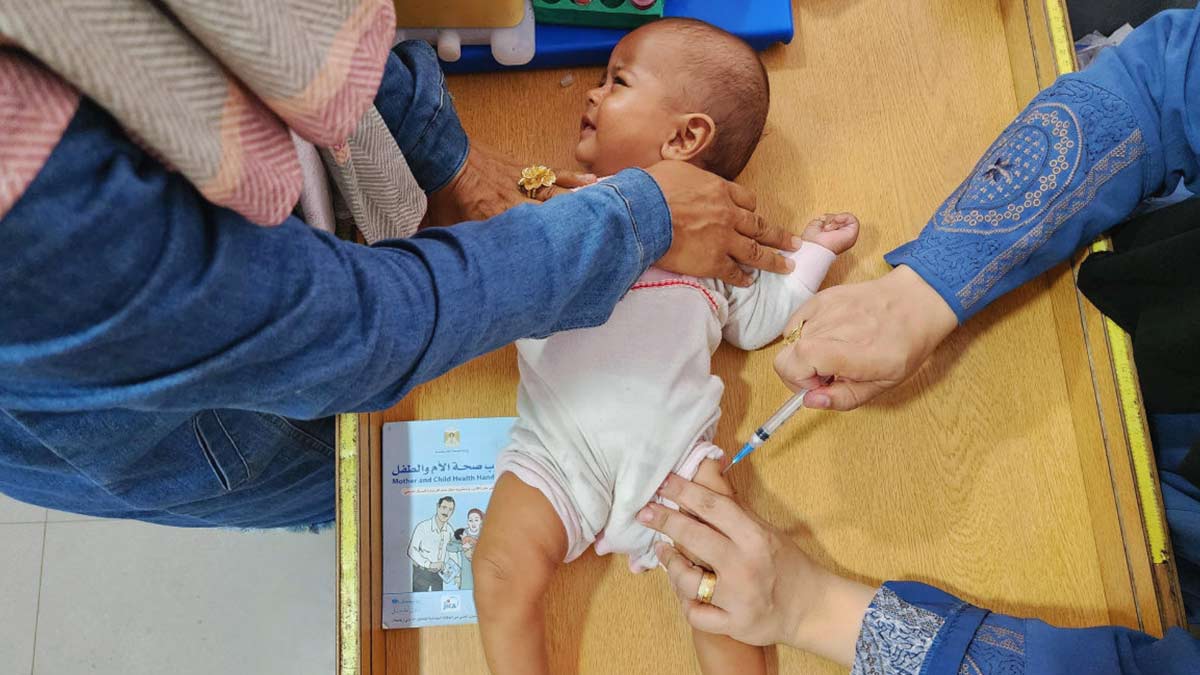
The Gaza Strip, a region already besieged by conflict and humanitarian crises, is now facing a new health emergency. For the first time in 25 years, a case of polio has been reported, marking a significant setback in global efforts to eradicate the virus. A 10-month-old baby has been paralyzed by the Type 2 polio virus, also known as cVVPV2, a variant of the virus that has become increasingly problematic in regions with insufficient healthcare and low vaccination rates.
Table of Content:-
The Re-Emergence of Polio in Gaza
Polio, a disease that once terrorized the world, causing widespread paralysis and death, had been largely eradicated due to rigorous global vaccination campaigns. However, the reappearance of the virus in Gaza is a stark reminder that the battle against polio is far from over, particularly in regions where health infrastructure is severely compromised. The case in Gaza has been confirmed by the World Health Organization (WHO) and highlights the vulnerabilities of war-torn regions to outbreaks of preventable diseases.
The infant, who has now lost mobility in his lower left leg, represents the first polio case in Gaza in over two decades. This unfortunate event has raised alarms within the international health community, prompting urgent calls for action. The United Nations Relief and Works Agency for Palestine Refugees (UNRWA) and other UN agencies have emphasized the critical need for immediate vaccination efforts to prevent further spread.

The Challenge of Vaccination in Conflict Zones
The ongoing conflict in Gaza has made it extremely difficult to implement effective vaccination campaigns. The constant violence, displacement, and destruction of healthcare facilities have created a precarious environment for public health initiatives. Despite these challenges, the UNRWA has reiterated the necessity of a humanitarian ceasefire to allow for the safe administration of vaccines to children in Gaza.
Also Read: Mpox Outbreak: More Than 1K New Cases Recorded In Congo In 7 Days, Reports CDC
In a recent statement, the Commissioner-General of UNRWA expressed deep concern over the situation, stating, "Polio does not distinguish between Palestinian and Israeli children. Delaying a humanitarian pause will increase the risk of spread among children." This plea underscores the indiscriminate nature of infectious diseases, which do not adhere to borders or political divisions.
The UNRWA's call for a humanitarian pause is not just a plea for the safety of Palestinian children but also for the protection of all children in the region. Without a pause in hostilities, it will be nearly impossible to carry out the vaccination campaigns necessary to prevent a wider outbreak. The WHO has announced plans to begin two rounds of polio vaccinations in Gaza, with the first round expected to start in late August and the second in September 2024.
Understanding the Type 2 Polio Virus
The Type 2 polio virus, while slightly less dangerous than the Type 1 and Type 3 strains, has been responsible for several outbreaks in recent years. This particular strain is a circulating vaccine-derived poliovirus (cVDPV), which occurs when the weakened virus used in the oral polio vaccine mutates and begins to spread in under-immunized populations. In areas with low vaccination coverage, such as Gaza, this mutated virus can cause outbreaks, leading to paralysis and even death in severe cases.
The resurgence of polio in Gaza is a grim reminder of the importance of maintaining high vaccination rates, even in the most challenging environments. The global effort to eradicate polio has made significant progress, but the emergence of cVDPV strains in regions like Gaza underscores the need for continued vigilance.
The Urgent Need for Global Support
The situation in Gaza requires immediate and coordinated international support. The global community must rally to provide the necessary resources for vaccination campaigns and to ensure that the children of Gaza are protected from further outbreaks. The WHO, UNRWA, and other international organizations are working tirelessly to mobilize resources, but the success of these efforts hinges on the cessation of hostilities and the establishment of safe corridors for healthcare workers.
In addition to the immediate need for vaccinations, there is also a pressing need to rebuild and strengthen the healthcare infrastructure in Gaza. Decades of conflict have left the region's health services in disarray, making it difficult to respond effectively to outbreaks of disease. Long-term solutions must focus on improving healthcare access, increasing vaccination coverage, and ensuring that all children, regardless of their circumstances, are protected from preventable diseases like polio.
Bottomline
The reappearance of polio in Gaza is a sobering reminder of the fragility of global health achievements in the face of conflict. The paralysis of a 10-month-old baby is a tragedy that could have been prevented with adequate healthcare infrastructure and vaccination coverage. As the world watches, it is imperative that the international community takes swift and decisive action to prevent further suffering and to ensure that polio is once again eradicated from Gaza and the world. The situation in Gaza highlights the need for peace, not only for the safety and security of its people but also for the protection of global health.
Also watch this video
How we keep this article up to date:
We work with experts and keep a close eye on the latest in health and wellness. Whenever there is a new research or helpful information, we update our articles with accurate and useful advice.
Current Version